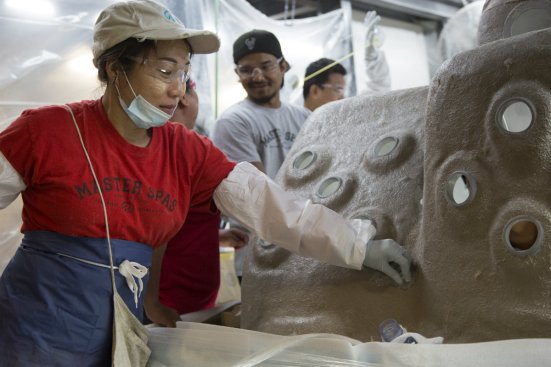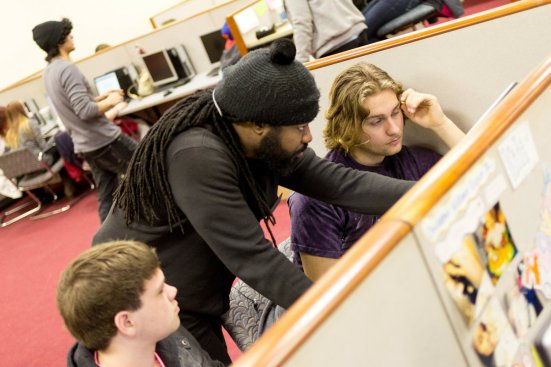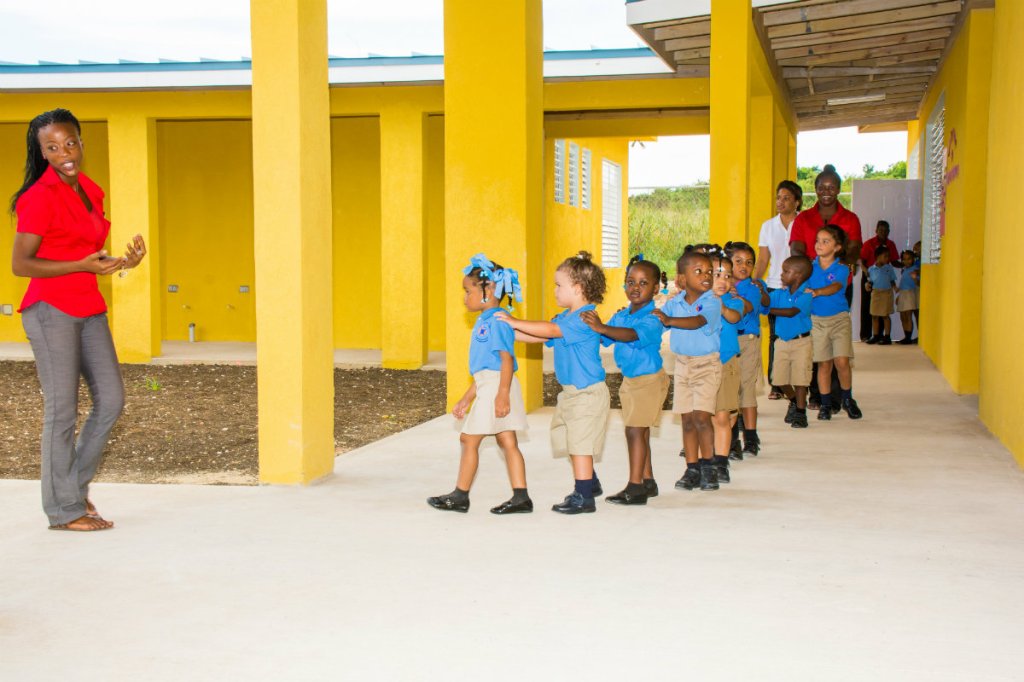When Bob Lauter offered to support the NAZ Children’s Centre in Montego Bay, Jamaica, he was thinking about purchasing some desks or computers.
But clearly the private school’s needs were greater than that.
Caribbean campus
Lauter, CEO of Master Spas, first learned of the school during a dealer retreat in 2010. He met its founder and principal, Alixann Campbell, saw the cramped classroom located in the upper floor of a nightclub, and left with a positive impression of the small school and its mission to teach special-needs students alongside children without disabilities.
He received an email from Campbell shortly after that visit. More than anything, she wrote, her students needed a better building that was safer and more conducive to learning.
“How do you respond to something like that?” Lauter asks.
He concluded that there was only one appropriate response: Commit to building a new school.
One month later, Master Spas kicked off its largest philanthropic effort in its history. The manufacturer had just introduced its line of Michael Phelps Signature Swim Spas and challenged dealers to donate a portion of every unit sold to the NAZ project with Master Spas contributing a matching amount.
Dealers raised nearly $200,000, but there would much more yet to do. For the project to reach fruition, it would need backing from the local business community. Lauter campaigned to raise the remaining amount, aided by a NAZ parent, who worked her connections with top executives.
Some big names came forward. Rose Hall Development — which owns two of the island’s top golf courses, along with the Cinnamon Hill Great House, country legend Johnny Cash’s Jamaican retreat — offered a prime piece of real estate for the school. A prominent architect contributed to the blueprints. And Digicell, the largest cell carrier on the Carribbean, donated toward the construction of the building, which was erected at cost.
The new facility opened in September of 2013, with 40 children enrolled.
But the story doesn’t end there. Many local high schools are not equipped to properly educate special-needs students, Lauter says. As a result, some NAZ students had nowhere to go upon graduating sixth grade. The next phase then would be building a high school. With the continued support of Master Spas and its dealers, NAZ cut the ribbon on a high school in September of this year, making it a complete K-12 institution.
Lauter and his wife, Sherry, have been so involved in the growth and development of NAZ – he estimates he spends two months a year in Jamaica — that they bought a home on the island. The children at the school call him Mr. Lauter.
There is an ornamental tree on the campus with bronze leaves, each engraved with the name of a Master Spas dealer who contributed toward the project. Dealers are frequently apprised of ongoing developments.
“They know the money is going to be spent wisely, and they’re changing lives,” Lauter says.
Today, NAZ educates about 120 students. “We’re beyond grateful,” Campbell says. “I tell the team all the time, ‘Now that we’re in our own structure, we’ve got to earn the right to be here.’”

Master Spas
Master Spas employs between 60 and 90 Burmese refugees.
Opportunities for refugees
Walk the factory floor of Master Spas’ Fort Wayne, Ind. manufacturing center and you’ll hear Burmese spoken among English-language workers without a hitch in production.
The company hires between 60 to 90 Burmese, representing a substantial percentage of its 500-strong workforce. All told, there are approximately 6,000 people living in Fort Wayne who were born in Myanmar, which used to be called Burma.
They came to the city seeking refuge from a region wracked by political unrest and religious persecution. Naturally, they needed jobs. Coincidentally, Master Spas needed workers. “We had the same problems a lot of people had,” says Mike Rees, director of operations. “We were having difficulties finding good help.”
Fortunately, Catholic Charities, which was overseeing a resettlement program in Fort Wayne, had inroads with Master Spas. An agent with the organization was married to an assistant manager at the manufacturing plant.
“She said ‘These are hard-working people. They’ve been persecuted. A lot of them are doctors and engineers and they’re looking for something — anything — they can do to keep themselves busy,’” Rees recalls.
Integrating the group into the production chain presented certain challenges at first. Rees acknowledges that the first couple of weeks were rocky. Dispersed throughout the factory floor, the Burmese struggled to work on their own.
“We made the mistake of spreading them out,” Rees says. “They didn’t have anyone to fall back on. We didn’t realize they’re a social culture — they like being together.”
So Rees arranged for the Burmese to handle certain manufacturing duties as teams. There are groups assigned to jetting, water testing, skirting and plumbing. “We kept them together in groups, and it was an overnight success,” he says.
Master Spas has also learned to allow for certain religious accommodations, such as Ramadan.
Several years into its refugee program, several Burmese have advanced through the ranks, with some now serving as line supervisors. “They are hard-working. They are industrial,” Rees says. “They’re everything you’d want a good group of employees to be.”
Master Spas officials are now consulting with area employers on how to integrate the Burmese into their workforces.

Master Spas
Master Spas built a classroom inside its manufacturing facility for the Crossing students.
From troubled, to leaders
Here’s a novel idea: Take students who, for whatever reason, don’t do their academic best in a conventional school setting and give them real-world business experience for high-school credit.
That, in a nutshell, is the Crossing, a unique faith-based curriculum that pairs reading, writing and arithmetic with hands-on training with a local employer.
It’s a mission that Master Spas embraced so wholeheartedly that the company built the Crossing students their own classroom in its Fort Wayne, Ind. manufacturing facility — a classroom students designed and partially constructed themselves.
Master Spas’ President Terry Valmassoi learned of the program at a business forum where Crossing CEO Rob Staley was a guest speaker. Staley’s pitch to local employers: Let his students come work for them several hours a day on their way to a high-school diploma. Employers only cover the cost of a teacher/instructor who’d accompany the working students.
Valmassoi was sold.
“I was pretty motivated by what I heard,” Valmassoi recalls.
The first order of business was to give the students, well, a business. Master Spas let them set up shop inside its facility, building and selling pallets that the manufacturer could use for shipping hot tubs and swim spas.
Students came from the Crossing’s downtown Fort Wayne campus, about 30 minutes away, to build pallets, monitor inventory, track expenses and invoicing using QuickBooks and, in general, learning all the ins and outs of being entrepreneurs for three hours a day. This experience gave them one of the biggest lessons in business: how to be competitive. Their pallet operation was undercut by a cheaper vendor.
A new plan was hatched: Students would work as independent contractors, performing piecework duties such as installing components in hot tubs. Valmassoi estimates they fulfill about 80% of the factory’s piecework needs.
It’s a good gig for students who might otherwise flunk out, or drop out, of a traditional high school.
The students, Valmassoi says, are fast and efficient. In addition to gaining practical skills on the assembly line, they make boardroom presentations, during which they must justify costs and recommend new processes. Some have gone on to work for Master Spas upon graduating.
The students now spend more time at Master Spas than ever. They have their own classroom, sparing them the travel-time to downtown. It was built at cost, thanks to vendors who donated supplies. In addition to a computer lab, the space has a loft where students can lounge.
Students work in shifts, with 15 in class and another 15 on the factory floor.
The teachers make the program a success, Valmassoi says. Many of the students come from broken homes. Some have been involved in gangs and drug dealing. Teachers do more than instruct — they’re spiritual leaders, as well.
“They are amazing,” Valmassoi says. “They invest their lives in these kids.”
Master Spas’ partnership with the Crossing is unique: It is the only company in the state to host a classroom as well as a micro-business. Other companies have taken notice. Master Spas officials take about three meetings a month with other employers to discuss how to incorporate a similar program.
Employees witness firsthand a real change in these students. “A lot of these kids have a lot of talent,” Valmassoi says. “You give them opportunity, and they really become young leaders.”
